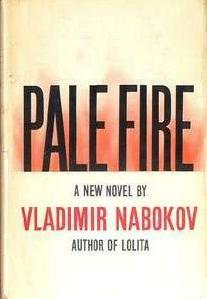
Pale Fire is a 1962 novel by Vladimir Nabokov. The novel is presented as a 999-line poem titled "Pale Fire", written by the fictional poet John Shade, with a foreword, lengthy commentary and index written by Shade's neighbor and academic colleague, Charles Kinbote. Together these elements form a narrative in which both fictional authors are central characters. Nabokov wrote Pale Fire in 1960–61, after the success of Lolita had made him financially independent, allowing him to retire from teaching and return to Europe. It was commenced in Nice and completed in Montreux, Switzerland.
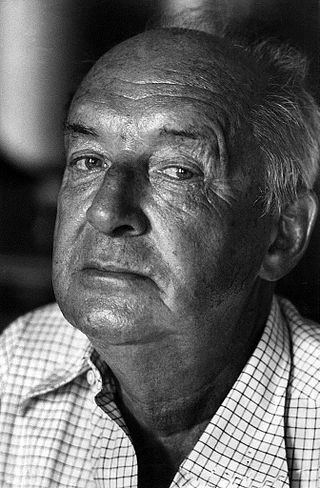
Vladimir Vladimirovich Nabokov, also known by the pen name Vladimir Sirin, was an expatriate Russian and Russian-American novelist, poet, translator, and entomologist. Born in Imperial Russia in 1899, Nabokov wrote his first nine novels in Russian (1926–1938) while living in Berlin, where he met his wife. He achieved international acclaim and prominence after moving to the United States, where he began writing in English. Nabokov became an American citizen in 1945 and lived mostly on the East Coast before returning to Europe in 1961, where he settled in Montreux, Switzerland.

Dhalgren is a 1975 science fiction novel by American writer Samuel R. Delany. It features an extended trip to and through Bellona, a fictional city in the American Midwest cut off from the rest of the world by an unknown catastrophe. It is number 33 on the 20th Century's Greatest Hits: 100 English-Language Books of Fiction list.

Always Coming Home is a 1985 science fiction novel by American writer Ursula K. Le Guin. It is in parts narrative, pseudo-textbook and pseudo-anthropologist's record. It describes the life and society of the Kesh people, a cultural group who live in the distant future long after modern society has collapsed. It is presented by Pandora, who seems to be an anthropologist or ethnographer from the readers' contemporary culture, or a culture very close to it. Pandora describes the book as a protest against contemporary civilization, which the Kesh call "the Sickness of Man".

LGBT themes in speculative fiction include lesbian, gay, bisexual, or transgender (LGBT) themes in science fiction, fantasy, horror fiction and related genres. Such elements may include an LGBT character as the protagonist or a major character, or explorations of sexuality or gender that deviate from the heteronormative.
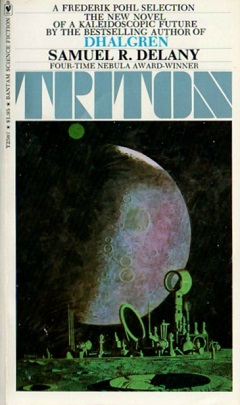
Trouble on Triton: An Ambiguous Heterotopia (1976) is a science fiction novel by American writer Samuel R. Delany. It was nominated for the 1976 Nebula Award for Best Novel, and was shortlisted for a retrospective James Tiptree, Jr. Award in 1995. It was originally published under the shorter title Triton.

Stars in My Pocket Like Grains of Sand (1984) is a science fiction novel by Samuel R. Delany. It is part of what would have been a "diptych", in Delany's description, of which the second half, The Splendor and Misery of Bodies, of Cities, remains unfinished.

The Original of Laura is an incomplete novel by Vladimir Nabokov, which he was writing at the time of his death in 1977. It was published by Nabokov's son Dmitri Nabokov in 2009, despite the author's request that the work be destroyed upon his death.

Lolita is an American 1962 black comedy-psychological drama film directed by Stanley Kubrick based on the eponymous 1955 novel by Vladimir Nabokov.

The Mad Man is a literary novel by Samuel R. Delany, first published in 1994 by Richard Kasak. In a disclaimer that appears at the beginning of the book, Delany describes it as a "pornotopic fantasy". It was originally published in 1994, republished and slightly revised in 1996, and republished again with significant changes in 2002 and again in an e-book version with further corrections in 2015. Delany considers the 2015 version the definitive edition.

Edmund Valentine White III is an American novelist, memoirist, playwright, biographer and an essayist on literary and social topics. Since 1999 he has been a professor at Princeton University. France made him Chevalier de l'Ordre des Arts et des Lettres in 1993.

Florence "Sally" Horner was an American girl who, at the age of 11, was abducted by serial child molester Frank La Salle in June 1948 and held captive for twenty-one months. It is believed that Vladimir Nabokov drew on the details of her case in writing his novel Lolita, although Nabokov consistently denied this.

Ekaterina is a 1993 novel by Donald Harington.
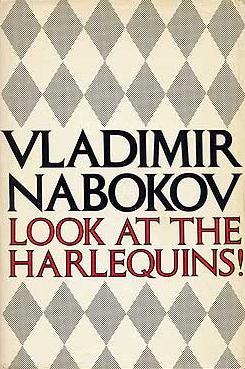
Look at the Harlequins! is a novel written by Vladimir Nabokov, first published in 1974. The work was Nabokov's final published novel before his death in 1977.
"Lolita" is an English-language term defining a young girl as "precociously seductive." It originates from Vladimir Nabokov's 1955 novel Lolita, which portrays the narrator Humbert's sexual obsession with and victimization of a 12-year-old girl whom he privately calls "Lolita", the Spanish nickname for Dolores. Unlike Nabokov, however, contemporary writers typically use the term "Lolita" to portray a young girl who attracts adult desire as complicit rather than victimized.
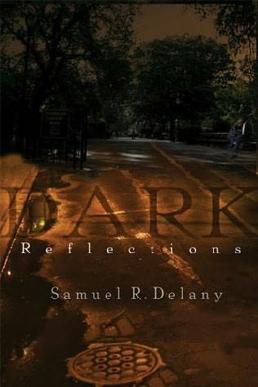
Dark Reflections is a novel by Samuel R. Delany, published in 2007 by Carroll & Graf, an imprint of Avalon Publishing Group. In 2008 it received a Stonewall Book Award and was nominated for a Lambda Literary Award for Gay Men's Fiction.

Lolita is a 1955 novel written by Russian-American novelist Vladimir Nabokov that addresses the controversial subject of hebephilia. The protagonist is a French literature professor who moves to New England and writes under the pseudonym Humbert Humbert. He describes his obsession with a 12-year-old "nymphet", Dolores Haze, whom he kidnaps and sexually abuses after becoming her stepfather. Privately, he calls her "Lolita", the Spanish nickname for Dolores. The novel was originally written in English, but fear of censorship in the U.S. and Britain led to it being first published in Paris, France, in 1955 by Olympia Press.

Samuel R. "Chip" Delany is an American writer and literary critic. His work includes fiction, memoir, criticism, and essays on science fiction, literature, sexuality, and society. His fiction includes Babel-17, The Einstein Intersection ; Hogg, Nova, Dhalgren, the Return to Nevèrÿon series, and Through the Valley of the Nest of Spiders. His nonfiction includes Times Square Red, Times Square Blue, About Writing, and eight books of essays. He has won four Nebula awards and two Hugo Awards, and he was inducted into the Science Fiction and Fantasy Hall of Fame in 2002.

Chesya Burke is an American editor, educator and author of comic books and speculative fiction, most notably horror and dark fantasy. She has published over a hundred short stories, essays, and articles in magazines and anthologies such as Clarkesworld, Apex Magazine, Nightmare Magazine, and Stories for Chip: A Tribute to Samuel R. Delany. Her short story collection Let's Play White was published in 2011 while her debut novel, The Strange Crimes of Little Africa, was released in late 2015. Nikki Giovanni has compared Burke's fiction to that of Octavia Butler and Toni Morrison.
Incest is an important thematic element and plot device in literature, with famous early examples such as Sophocles' classic Oedipus Rex, a tragedy in which the title character unwittingly kills his father and marries his mother. It occurs in medieval literature, both explicitly, as related by denizens of Hell in Dante's Inferno, and winkingly, as between Pandarus and Criseyde in Chaucer's Troilus. The Marquis de Sade was famously fascinated with "perverse" sex acts such as incest, which recurs frequently in his works,The 120 Days of Sodom (1785), Philosophy in the Bedroom (1795), and Juliette (1797).


















